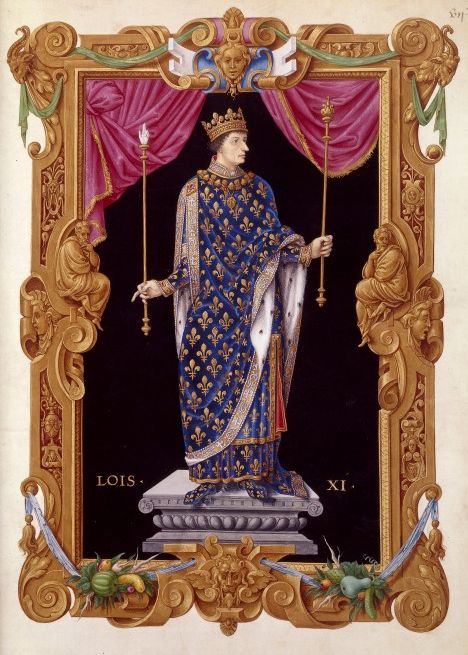
King Louis XI of France knew Philip the Good, Duke of Burgundy and his son Charles on an intimate basis. In the 1450’s, while Louis was Dauphin, he was feuding with his father, King Charles VII and asked for permission to leave the royal court and live in his personal fief of the Dauphiné. His father permitted him to leave but on the promise he would return in four months.
Well, he stayed there for years, defying his father in a myriad of ways. His renegade behavior reached its peak when he married the nine year old Charlotte of Savoy against his father’s wishes. Charles VII sent an army after him in 1456. To avoid an all-out battle with his father’s forces, Louis fled to the court of Burgundy where he was heartily received by his uncle Philip the Good. Philip did everything in his power to ingratiate himself with Louis to the point of groveling. He gave Louis a pension and allowed him to live in his castle of Genappe. During these years in Burgundy, Louis was able to scrutinize and closely observe the personalities of Philip and his only son Charles who was known as the Count of Charolais at the time.

Charles viewed Louis with suspicion and distrust and rightly so. Louis was already dead set on following through with his intention to seize as many of the holdings of the Duke of Burgundy as he could and annex them into the kingdom of France. Charles, for his part, was intent on regaining the royal towns along the Somme River in northern France. Possession of these towns had bounced back and forth between Burgundy and France for years. Louis was ten years older than Charles so they had little in common. The only pastime they shared was hunting and while Louis was in Burgundy, the two men could regularly be seen riding off to hunt various game.
Richard Vaughan, in his biography of Charles the Bold, uses a large variety of words to describe his personality. He says he was violent, cruel, brutal, moody, temperamental, obstinate, indecisive, vain, egotistical, ostentatious, and subject to changing his mind. Therefore, it is no surprise Louis found Charles rigid and austere, humorless and hot-headed. He would eventually reveal to Louis his excessive pride, his sharp-tongue and his extreme ambitiousness. Like his father, Charles wanted a crown for his Imperial holdings. He would do anything to aggrandize himself and obtain more territory, even if it meant butting heads and going into battle against his sovereign lord, King Louis XI of France.
King Charles VII died in 1461 and Louis fled the court of Burgundy precipitously, leaving his wife behind and was crowned King of France. The Duke of Milan Francesco Sforza’s best ambassador was a man named Alberice Malleta who was a Doctor of Canon and Civil Law. Sforza sent him to the court of the new French king and Louis took to him instantly.

Louis dragged Malleta around with him on his sojourns throughout his kingdom in his customary, unorthodox fashion. Louis loved to ride on horseback, even working while riding. If the opportunity to hunt arose, this allowed him to indulge his passion immediately. He reveled in staying in the homes of his subjects, even those of peasants. He enjoyed dressing and eating simply while on the road. Malleta was not fond of these travels and noisily complained about the accommodations. But Louis convinced the ambassador to stay by his side for quite some time.
During one of his long and confidential conversations with Malleta, Louis discussed his observations on the personality of the Count of Charolais. The conversation took place on Christmas Day in 1463, early on in Louis’ reign. Louis revealed to Malleta “that this son of the duke of Burgundy was of very little worth and had little good sense. He was proud, irascible and somewhat bestial. And (Louis) spoke of him most maliciously, making maniacal gestures which he claimed (the Count of Charolais) was in the habit of making”.
Louis said these things even though he had remained friends with Charles while he was in Burgundy. Once Louis became king, relations between him and Charles deteriorated. Charles became Duke of Burgundy upon the death of his father in June of 1467. By this time, affairs between the Louis and Charles were so bad, armies were engaged to fight and war broke out. After many years of intermittent conflict, Louis realized his dream and finally annexed Burgundy into France upon the death of Charles at the Battle of Nancy on January 5, 1477.
Further reading: “Philip the Good” by Richard Vaughan, “Louis XI: The Spider King” by Paul Murray Kendall, “Charles the Bold” by Richard Vaughan, “Isabel of Burgundy” by Aline Taylor
Reblogged this on History's Untold Treasures and commented:
H/T The Freelance History Writer
LikeLike
Also shows what effect a translation can have. I have seen Charles the Bold less frequently but still often translated into English as Charles the Rash – instantly puts a different spin on the character of the man. Possibly nearer the mark, as well.
LikeLike
[…] of rebellions which define his rule as Duke of Burgundy. There is a good deal of reference to the hatred between Charles and King Louis XI of France, the subject of quite a bit of interpretation and discussion by […]
LikeLike
[…] Origen: King Louis XI of France Comments on the Personality of Charles the Bold, Duke of Burgundy […]
LikeLike
It seems Burgundy was always the prize everyone wanted. This is an interesting part of that story. Then as now, personalities shape and reshape history.
LikeLiked by 1 person
Yes Claudia! The personalities are what I find most fascinating. Because Charles was such a hothead, Louis won the prize with his dogged persistence. You can’t make this stuff up!
LikeLike
Very nice article. Happy to see book suggestions. Thank you so much for the work!
LikeLike